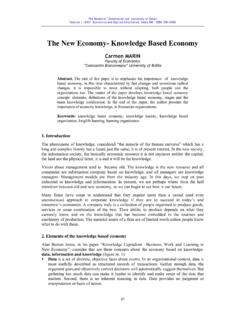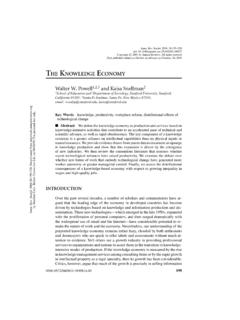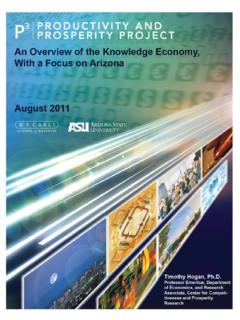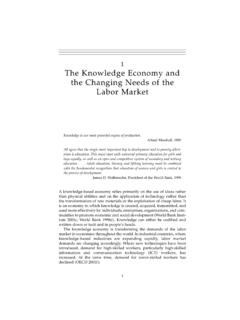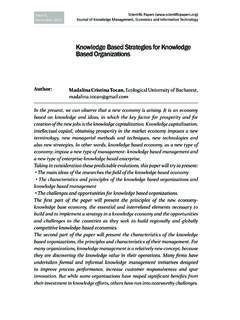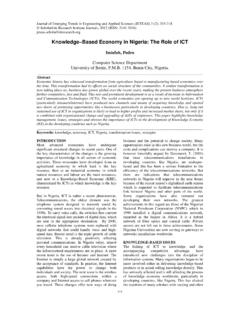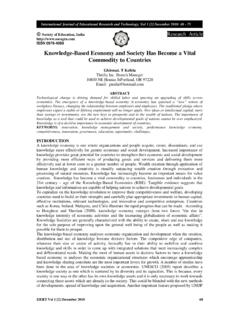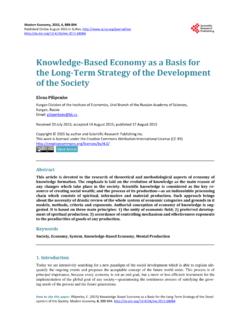Transcription of LIBRARIES AND THE KNOWLEDGE-BASED ECONOMY (KBE)
1 Guest Editorial LIBRARIES and the KNOWLEDGE-BASED ECONOMY (KBE). Abdus Sattar Chaudhry*. KBE is an ECONOMY in which the generation, distribution and use of knowledge are the main drivers of growth, wealth creation and employment across all industries. Effective exploitation of information in organizations appears to be a distinguishing characteristic of this new socio-economic model. As a result, knowledge management (KM) has emerged as an important area in KBE. KM focuses on creation, codification, sharing, and application of knowledge within the context of an organization. There has been a wide-spread realization that for success in businesses, organizations, communities, nations, and societies in the KBE era, steps need to be taken to facilitate creation and use of knowledge at all levels.
2 This new initiative has created unprecedented opportunities for institutions that deal with information and knowledge . It is obvious that LIBRARIES have always been on the fore front of facilitating access to information and knowledge . While role of knowledge management seems to be well recognized and discussed, there appears to be lack of guidelines on how to prepare LIBRARIES to take maximum advantage of opportunities made available by KM initiatives. While LIBRARIES have been active in facilitating access to information, in order to contribute toward KBE and KM they need to appreciate the emphasis on the effective creation and use of knowledge to respond to the requirements of the new environment. An important step in this process is a clear understanding of the focus of KM.
3 And competencies required for its effective support. LIBRARIES have been dealing with documents and external information while KM places emphasis on internal information and people. KM focuses more on tacit knowledge that resides in employees. A unique mix of technological, psychological, and communication skills is *. Associate Professor, Department of Library and Information Science, College of Social Sciences, Kuwait University, Kuwait. Email: LIBRARIES and KBE. required for performing KM functions. LIBRARIES have the potential to play an important role in supporting KM functions. Their client-centered approach, emphasis on service, and experience in efficiently running information systems make them ideal candidates for providing support in knowledge management work.
4 Library managers, however, need to change their mind-set and expand their competencies by enhancing their communication and leadership capabilities to become active participants in the knowledge creation and application processes. To reach this level, concurrent efforts at individual, professional, and institutional level will have to be made to reposition LIBRARIES . There is also a need to re-orient library and information (LIS) professionals to take advantage of the new opportunities. There have been some concurrent developments in the information field that make it easy for LIBRARIES to prepare for more active role in supporting knowledge workers. Notable among these developments are use of social media, social software, and social networking websites; sometimes referred to as Web tools.
5 A closer look at these tools indicates that it is not only the use of technology but a change in attitude that is required to take full advantage of the potential of social media for supporting KM. The most drastic change expected in LIBRARIES in this regard is to reconcile with the idea of making their users as partners in the design and development of various services and programs in their LIBRARIES . Users can enhance knowledge in LIBRARIES by contributing through social tagging and other social net-working activities. LIBRARIES that are taking advantage of these initiatives to transform their services or programs have also been referred to as social LIBRARIES '. which is another manifestation of knowledge management. Whatever these new initiatives are called, success in the new environment will depend on collaboration and communities.
6 Leveraging the wisdom of the community and social networks seems to be an important aspect of the new phenomenon often referred to as social knowledge , social capital, and social intelligence. LIBRARIES can take advantage of the initiatives of KBE, KM, and social media by creating environments that facilitate collaboration with communities of users. A challenge in this is a move from rigidity to flexibility. A major strength of LIBRARIES has always been an emphasis on standardization where predetermined structures played an important role in organization of information resources and design and development of services and programs. They used systems which were developed for Abdus Sattar Chaudhry information professionals and were highly dependent on experience and knowledge of professionals.
7 For example, bibliographic community has successfully developed and used controlled vocabularies, classification schemes, and metadata creation rules. These tools and standards were always used with the objectives of consistency and uniformity. Therefore, LIBRARIES always tried to keep this work to highly trained and experienced LIS professionals. The new initiatives place an emphasis on collective wisdom encouraging participation of users in library work which was always done by professionals. If LIBRARIES were to take advantage of the newly developed tools such social tagging and social media, they will have to integrate social tagging practices into their bibliographic practices. Social tagging follows a philosophy of collaborative work to allow use of vocabularies ( , social tagging) which is not based on standard pre-defined structures.
8 It also encourages participation in the information organization and other activities not necessarily restricting to trained professionals. It actually works on a philosophy of democratic contribution by any users. This requires a fundamental change in the way LIBRARIES work as fostering deeper collaboration has become necessary for relevance and success. This is an opportune time for LIBRARIES to reposition them to be seen as an important partner in the information and knowledge scene. While standards and tools are crucial and use of the smart technologies in a clever way is important, role of LIBRARIES in the new milieu will mainly depend on embracing the imperatives of socialization of knowledge . LIBRARIES are expected to take full advantage of social media such as wikis, blogs, and social networks.
9 They must remain open to collaboration of users to take advantage of community wisdom. Some LIBRARIES appear to be very excited about this transformation for advancing KM and KBE while others appear to have apprehensions about the lack of control implied in the collaborative model. It has been pointed out that a better approach would not be to tell LIBRARIES what to do but to make them aware of the pitfalls that may make them miss this outstanding opportunity of becoming part of the broader information scene. Phil Green, the Chief Technology Officer at Inmagic, has stated these pitfalls as missteps to social library (Green, 2008): 1. Painting librarians out of the picture. 2. Not understanding what a true knowledge management system is.
10 3. Passively managing information. LIBRARIES and KBE. 4. Improvising with a content management system. 5. Using isolated wikis and blogs. Initiatives of the KNOWLEDGE-BASED ECONOMY combined with the emergence of the discipline of knowledge management and unprecedented availability of social media tools make an excellent opportunity for LIBRARIES to become important partner in the knowledge scene. However, it requires quick and bold decisions on part of the community of information professionals to be responsive to the imperatives of the social library in order to take full advantage of the new opportunities. _____. Green, P. (2008). Social LIBRARIES : The next generation of knowledge management. Information Outlook, 12(12), 10-14.






![nÁ0` h]´ VP h^ÄE°h´ÅÊQ⌦µh^˨½ DÅ⌦En¨½ À¹ ÌÄjÅ⌦ÊPÅj {´Ì](/cache/preview/7/8/7/0/6/2/b/7/thumb-787062b7e87e0e8e4ae0396a2098f16c.jpg)



